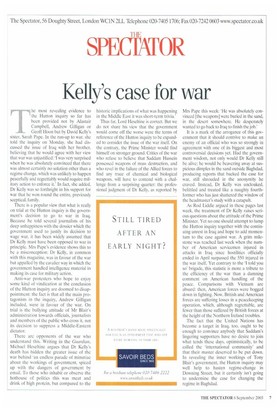SPECTATOR
Kelly's case for war
he most revealing evidence to the Hutton inquiry so far has been provided not by Alastair Campbell, Andrew Gilligan or Geoff Hoon but by David Kelly's sister, Sarah Pape. In the run-up to war, she told the inquiry on Monday, she had discussed the issue of Iraq with her brother, believing that he would agree with her view that war was unjustified: I was very surprised when he was absolutely convinced that there was almost certainly no solution other than a regime change, which was unlikely to happen peacefully and regrettably would require military action to enforce it.' In fact, she added, Dr Kelly was so forthright in his support for war that he won round the entire, previously sceptical, family.
There is a popular view that what is really on trial at the Hutton inquiry is the government's decision to go to war in Iraq. Because he told several journalists of his deep unhappiness with the dossier which the government used to justify its decision to wage war, it has been widely assumed that Dr Kelly must have been opposed to war in principle. Mrs Pape's evidence shows this to be a misconception: Dr Kelly, in common with this magazine, was in favour of the war but appalled by the cavalier way in which the government handled intelligence material in making its case for military action.
Anti-war protesters who hope to enjoy some kind of vindication at the conclusion of the Hutton inquiry are doomed to disappointment: the fact is that all the main protagonists in the inquiry, Andrew Gilligan included, were in favour of the war. On trial is the bullying attitude of Mr Blair's administration towards officials, journalists and members of the public who cross it, not its decision to suppress a Middle-Eastern dictator.
There are opponents of the war who understand this. Writing in the Guardian, Michael Heseltine argues that Dr Kelly's death has hidden the greater issue of the war behind an endless parade of minutiae about the workings of government, spiced up with the dangers of government by email. To those who inhabit or observe the hothouse of politics this was meat and drink of high protein, but compared to the historic implications of what was happening in the Middle East it was short-term trivia.'
Thus far, Lord Heseltine is correct. But we do not share his view that the government would come off the worse were the terms of reference of the Hutton inquiry to be expanded to consider the issue of the war itself. On the contrary, the Prime Minister would find himself on stronger ground. Critics of the war who refuse to believe that Saddam Hussein possessed weapons of mass destruction, and who revel in the failure of the Allied forces to find any trace of chemical and biological weapons, will have to contend with a challenge from a surprising quarter: the professional judgment of Dr Kelly, as reported by Mrs Pape this week: 'He was absolutely convinced [the weapons] were buried in the sand, in the desert somewhere. He desperately wanted to go back to Iraq to finish the job.'
It is a mark of the arrogance of this government that it should contrive to make an enemy of an official who was so strongly in agreement with one of its biggest and most controversial decisions yet. Had the government wisdom, not only would Dr Kelly still be alive; he would be beavering away at suspicious dimples in the sand outside Baghdad, producing reports that backed the case for war, still shrouded in the anonymity he craved. Instead, Dr Kelly was uncloaked, belittled and treated like a naughty fourthformer who has just shattered the window of the headmaster's study with a catapult.
As Rod Liddle argued in these pages last week, the treatment of Dr Kelly raises serious questions about the attitude of the Prime Minister. Yet no one should attempt to lump the Hutton inquiry together with the continuing unrest in Iraq and hope to add momentum to the case against war. A grim milestone was reached last week when the number of American servicemen injured in attacks in Iraq since hostilities officially ended in April surpassed the 550 injured in the war itself. Yet contrary to the 'I told you so' brigade, this statistic is more a tribute to the efficiency of the war than a damning comment on American handling of the peace. Comparisons with Vietnam are absurd: then, American forces were bogged down in fighting. Now. British and American forces are suffering losses in a peacekeeping operation, which, although regrettable, are fewer than those suffered by British forces at the height of the Northern Ireland troubles.
The fact that the United Nations has become a target in Iraq, too, ought to be enough to convince anybody that Saddam's lingering supporters have no desire to join what tends these days, optimistically, to be called the 'international community' and that their master deserved to be put down. In revealing the inner workings of Tony Blair's government, the Hutton inquiry may well help to hasten regime-change in Downing Street, but it certainly isn't going to undermine the case for changing the regime in Baghdad.










































































 Previous page
Previous page